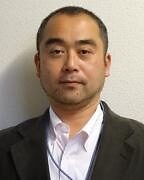[Seminar] "Graphene Oxide as a Super Material" by Prof. Shinya Hayami (Department of Chemistry, Kumamoto University)

Date
Location
Description
Abstract:
Graphene oxide (GO) is 2D nanosheet, and has many functionalities, for example, proton conductivity.[1] The GO has negative charge because GO has many oxygen functional groups such as epoxide group, carboxyl group, hydroxyl group and so on. Therefore, GO can combine with positive charge cations such as proton, metal ions, complexes and so on. Furthermore, the hybrids can be prepared by not only electrostatic interaction but also π-π stacking or chemical bonding between epoxy and amine groups.[2] After reduction of GO by hydrazine, UV irradiation or annealing, reduced GO (rGO) can be produced, which shows electrical conduction.
Many kinds of possibilities in GO and rGO are demonstrated. Ion conduction through a GO membrane is pH switchable; that is, under acidic conditions GO behaves as a H+ conductor while under basic conditions it acts as an OH– conductor. Our findings not only make available a new single-phase GO-based OH– conductor but also opens a new door for future research on ion conduction switching of H+ and OH– ions in a single material. Furthermore, we focused on the effect of different synthesis techniques of metal supported GO for the microwave-assisted catalytic decomposition of carbohydrates to 5-hydroxymethylfurfural (5-HMF), where the effect of reaction conditions, amount of catalyst used, effect of solvent, was also evaluated.

Fig. 1 Structure of GO hybrids with a various of molecules
[1] S. Hayami et al., Chem. Commun., 2014, 50, 14527. Chem. Mater., 2014, 26, 5598. Angew. Chem., Int. Ed., 2014, 53, 6997. J. Am. Chem. Soc., 2013, 135, 8097.
[2] S. Hayami et al., Adv. Funct. Mater., 2013, 23, 323. Dalton Trans., 2015, 44, 5049. Inorg. Chem. Front., 2015, 2, 886.
CV: Dr. Shinya Hayami is professor of Inorganic Chemistry at Kumamoto University. He received his Ph. D. degree in 1997 from Kyushu University and two post-doctoral stints in at Institute for Molecular Science (IMS) from April 1998–March 1999 and Kanagawa Academy of Science and Technology (KAST) from April 1999–September 2000. He joined the Department of Chemistry at Kyushu University as an Assistant Professor in October 2000 and the Department of Chemistry at Hiroshima University as an Associate Professor in January 2007. He joined Kumamoto University as a professor in April 2009. His research interests include the study of photo induced phase transition, advanced soft materials, and graphene hybrids.
Subscribe to the OIST Calendar: Right-click to download, then open in your calendar application.



